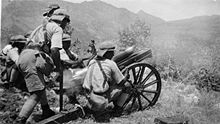Ahmed Barzani
Sheikh Ahmed Barzani ( Kurdish ئهحمهد موحهممهد بارزانی; * 1896 ; † January 11, 1969 in Baghdad ) also known as Khudan (خودان) was the head of the Barzani clan in the Iraqi part of Kurdistan. Ahmed Barzani is considered to be the person who united the Barzani clan and expanded their dominion. Together with his brother Mustafa Barzani , he fought against the Iraqi government in the 1920s and 1930s.
He was the son of Sheikh Mohammed Barzani and one of five brothers who also played important roles in the Kurdish political movement. Ahmed Barzani succeeded his older brother Abdulselaam, who was hanged after an uprising in 1914, as tribal leader.
Riots
In addition to local disputes with hostile tribes Ahmed Barzani 1919/1920 leaned against the British , which is a mandate of the League of Nations on the Iraq occupied. The first major Barzani uprising took place in 1931 and was directed against other Kurdish tribes as well as against government troops. After the uprising was put down with British air support, Ahmed Barzani fled to Turkey and was arrested there. He was allowed to return to Iraq in 1935, but had to go into exile with other family members in southern Iraq. Ahmed Barzani led further uprisings until 1937 and earned the respect of opposing generals such as General Abdul-Jabar Barznji, commander of the Iraqi army in Barzan. Both later became close friends.
Ahmed Barzani was in contact with the Kurds in Turkey and sympathized with the Xoybûn who fought against the Turkish army in the Ararat uprising in the 1930s . Ahmed Barzani took in many Kurdish refugees from Turkey. The Turkish government under İsmet İnönü complained to Iraqi Prime Minister Nuri as-Said that Ahmed Barzani supported the Ararat uprising. Turkey pledged support to the Iraqi army if they took action against Ahmed Barzani.
In the turmoil of the Second World War , he and his brother were able to flee from their exile in Iran, where he joined the Republic of Mahabad . In 1947 he surrendered to the Iraqi government and was sentenced to death. The death sentence was then commuted to life imprisonment. After the military coup and the overthrow of the monarchy in July 1958 by General Abd al-Karim Qasim , he was released. His brother Mustafa Barzani, who had lived in the Soviet Union for years, had now taken his place . Ahmed Barzani died in the 1960s.
Religious views
There is much speculation and disputes about Ahmed Barzani's religious views. His family belonged to the Naqschbandi order and had a tekke , which was a kind of convent, in Barzan, which made them very influential in the region. But Ahmed Barzani showed eccentric behavior over time, which was in stark contrast to his position as a Sufi cleric. After taking power in Barzan, one of his mollas named Abd al-Rahman proclaimed in 1927 that Ahmed Barzani was God and he himself was his prophet . Furthermore, Ahmed Barzani's followers should no longer pray in the direction of Mecca . Molla Abd al-Rahman was later murdered by Muhammad Sadiq, a brother of Ahmed Barzani.
About ten weeks later, the Balik tribe announced their loyalty to Ahmed Barzani and recognized his supposed divinity. Ahmed Barzani, presumably as a provocation, allowed his followers to eat pork and ordered the burning of Koran books . In 1931, Ahmed Barzani's religious eccentricity led to a war with the Barardust tribe under their leader, Sheikh Rashid of Lolan, who was an old rival Naqshbandi leader. The Barardust attacked the villages in Barzan in July 1931. After a series of counter-attacks and looting, Ahmed Barzani won in November 1931. Sheikh Raschid von Lolan went into exile in Iran.
Other sources claim that Ahmed Barzani converted to Christianity .
environmental Protection
Ahmed Barzani was the first known Kurdish leader who also campaigned for environmental protection. He issued several bans to protect the environment and keep it clean:
- Do not cut down trees that prevent erosion and provide shade
- No excessive collecting of honey
- Don't kill non-poisonous snakes
- Do not fish with dynamite or other explosives
- Do not hunt animals that are in their breeding season
Ahmed Barzani's legacy
Ahmed Barzani was against the traditional way of inheriting leadership within the same family. Instead, the most qualified person should be chosen as the leader. He condemned the corruption that was beginning to show itself in the Kurdish movement.
Individual evidence
- ↑ Article BĀRZĀNĪ from Iranica
- ↑ Sheikh Ahmed Barzani passed away ( Memento from December 22, 2014 in the Internet Archive ) kurdsat.tv on January 11, 2012
- ^ A b The Kurdish Minority Problem , p. 11, December 1948, ORE 71-48 ( Memento of August 25, 2008 in the Internet Archive ).
- ^ David McDowall: A modern history of the Kurds , IBTauris Publishers, 2004, Google Print, p. 178 .
- ↑ a b Sheikh Ahmed Barzani V (1896 - 1969) ( Memento from December 5, 2008 in the Internet Archive ); Article from KurdishMedia.com from September 24, 2008
literature
- Marion and Peter Sluglett: Iraq since 1958 - From Revolution to Dictatorship . Suhrkamp Frankfurt 1991
- Mehmet Şahin, Kauffeld: Data and facts on Kurds and Kurdistan , p. 275
| personal data | |
|---|---|
| SURNAME | Barzani, Ahmed |
| ALTERNATIVE NAMES | Sheikh Ahmed Barzani, Khudan |
| BRIEF DESCRIPTION | Kurdish clergyman and tribal leader |
| DATE OF BIRTH | 1896 |
| DATE OF DEATH | January 11, 1969 |
| Place of death | Baghdad |
